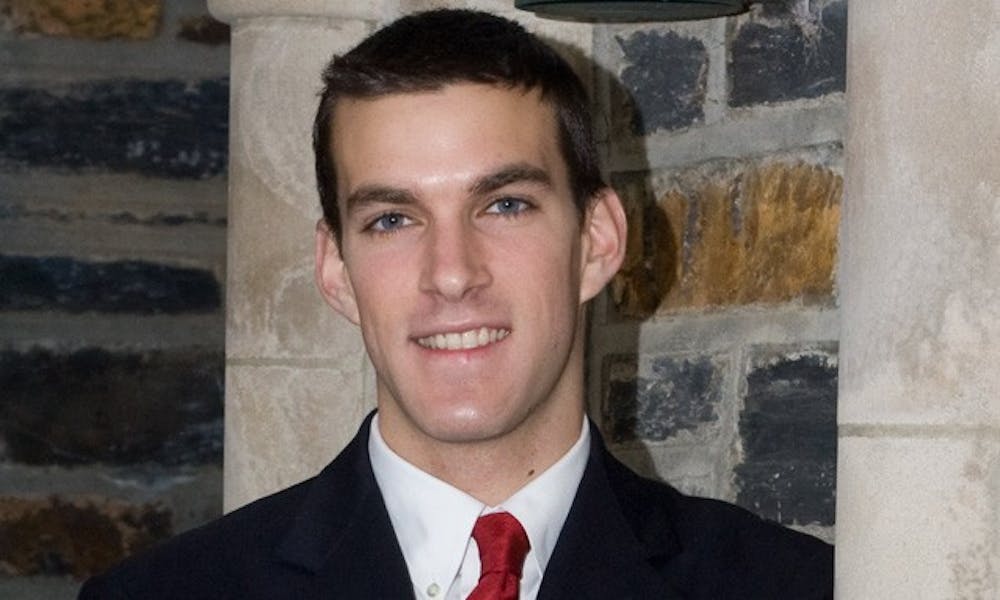The first-ever undergraduate Young Trustee election has ended, but debate surrounding the process is far from over.
Senior John Harpham was confirmed the new undergraduate Young Trustee at about 2:30 a.m. Wednesday, more than six hours after polls officially closed Tuesday night. Harpham had won by three votes in an instant runoff, but complaints filed by Young Trustee finalist Chelsea Goldstein, a senior, and junior Gregory Morrison, Duke Student Government executive vice president, led to an impromptu DSG judiciary meeting late Tuesday to discuss campaign procedures.
Although Goldstein, former DSG vice president for academic affairs, had 908 first-preference votes—90 more votes than Harpham’s 818—the instant runoff brought the final count to 1,054 to 1,051 in favor of Harpham, former chair of The Chronicle’s independent editorial board.
Young Trustee Nominating Committee Chair Lauren Moxley, a sophomore, said although she was pleased with the campaign, there will definitely be reforms in the future.
“This year was a learning process and we’ll take what we learned to make the process better next year,” she said.
DSG President Awa Nur, a senior, said the YTNC is working on compiling a memo to evaluate the campaign structure, and will suggest improvements for future elections—these reforms may include restructuring the election and evaluating the instant runoff.
“We’re still in the process of gathering data and gathering opinion,” Nur said. “A few senators expressed their grievances with the process, but I don’t know what actions the YTNC will take.”
She added that it is still too early to pinpoint specific areas that may need modification.
Even before the election took place, grievances had been voiced regarding the campaigning process.
Goldstein said she filed her two-part complaint to the YTNC Feb. 3. She disputed Harpham’s campaigning methods, which included obtaining personal letters of support that were published in The Chronicle—and later, on his campaign Web site—and a video he posted on his Facebook page Monday challenging basketball player Nolan Smith, a junior, to a one-on-one game.
Goldstein also obtained endorsement letters from student organizations, which were published in The Chronicle as “Young Trustee Endorsements.” Harpham’s letters of support, however, were published as letters to the editor.
Goldstein said she felt the letters were inappropriate and gave Harpham an unfair advantage.
“John just had two of his friends to write in for him, when in fact I got two real endorsements,” Goldstein said. “The writers of those letters didn’t interview all three of us –they were presented as equivalent visually in the newspaper... if The Chronicle does want to start accepting letters like this, they should have informed all the candidates.”
The letters published in The Chronicle endorsing Harpham were written by Malik Burnett, Trinity ’07 and currently pursuing graduate degrees at the Fuqua School of Business and the Medical School, and Christine Westfall, president of the Trinity Heights Neighborhood Association. Harpham said although he was close friends with Burnett, he only had a professional working relationship with Westfall.
“I know that to some extent, campaigns are games of maximum mobilization and I wanted to introduce people with a few more informed and thoughtful and detached voices,” Harpham said.
Junior Will Robinson, editor of The Chronicle and president of Duke Student Publishing Company, said that to his knowledge, The Chronicle had not published personal letters in recent campus-wide campaigns.
After Goldstein’s complaint, Moxley modified the campaign policy so that individual endorsers would need to interview all three candidates for an equal amount of time before writing an endorsement letter.
Moxley also contacted Robinson concerning the letters after Goldstein’s complaint, and the following day, The Chronicle published an editor’s note clarifying the difference between the official endorsements and personal letters of support to the editor.
“We consider letters to the editor under our own letters policy,” Robinson said. “The YTNC has no standing to regulate The Chronicle in any way—we are an independent publication that is not governed by the rules... of any campaign.”
Furthermore, Goldstein said she felt Harpham received special treatment from The Chronicle because of his affiliation with the organization, although both Goldstein and Harpham have served as members of The Chronicle’s independent editorial board.
“John has been associated with The Chronicle for the past four years and for him to have this is unfair to the two of us,” Goldstein said, referring to herself and Perret. “If we contacted people to write letters Wednesday... they would only be published Monday or Tuesday and that would not give us enough time to catch up.”
Although The Chronicle did not publish any other personal letters supporting a candidate during this Young Trustee campaign, Robinson said in forthcoming elections, the decision will be in the hands of future editors of The Chronicle, and not the YTNC.
“The campaign policy only regulates individuals who are campaigning,” Robinson said. “[Goldstein] should have directed criticism at Lauren Moxley which ultimately, she did.”
Get The Chronicle straight to your inbox
Signup for our weekly newsletter. Cancel at any time.

